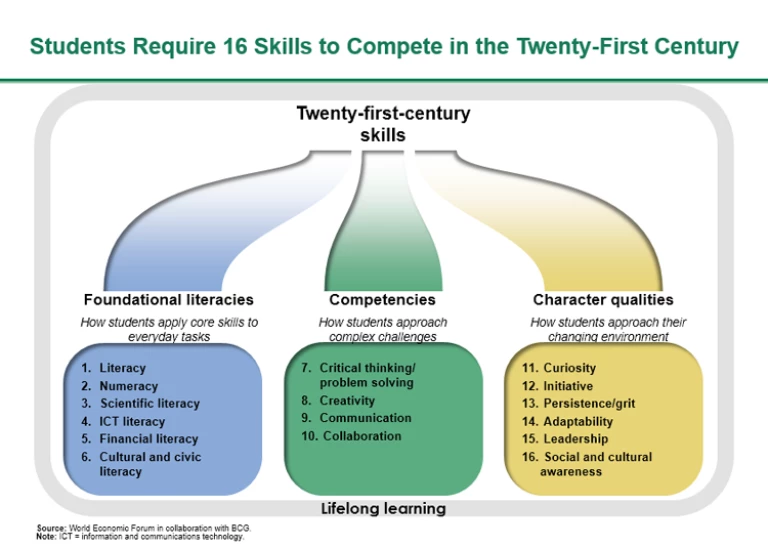Today’s fast-changing world requires students who not only possess strong skills in areas such as language arts, math, and science but must also be adept at skills such as critical thinking, problem solving, persistence, collaboration, and curiosity. The requisite twenty-first-century skills fall into three broad categories: foundational literacies, competencies, and character qualities. (See the exhibit “Students Require 16 Skills to Compete in the Twenty-First Century.”)
All too often, however, students in many countries are not acquiring these skills. A study that included nearly 100 countries reveals large gaps in selected indicators for many of these skills. For example, the U.S. performs relatively well on many skills when compared with the entire world. But when compared with high-performing peers such as Japan, Finland, or South Korea, the U.S. shows significant skills gaps in numeracy and scientific literacy. Some countries display gaps between our broad categories of skills. For example, relative to other OECD countries, Poland and Ireland perform well on a range of indicators representing foundational literacies but lag behind other OECD countries in areas such as critical thinking and curiosity. Gaps such as these are clear signs that too many students are not getting the education they must have to prosper in the twenty-first century, and countries are not finding adequate numbers of the skilled workers they need to compete.
Numerous innovations in the education technology space are beginning to show potential for helping address skills gaps. These technologies could both lower the cost and improve the quality of education.
A new report by the World Economic Forum, written in collaboration with The Boston Consulting Group and titled New Vision for Education: Unlocking the Potential of Technology , examines ways that education technology can enhance learning as one tool in a portfolio. We surveyed the education technology landscape for trends and promising approaches related to developing twenty-first-century skills. On the basis of our research results and interviews with dozens of experts in education, we identified a number of resources and tools, including personalized and adaptive content and curricula, open educational resources, and digital professional-development resources for teachers. The report highlights three school networks from different parts of the world that have deployed technology in innovative ways to improve student outcomes by developing twenty-first-century skills.
We found that education technology can complement existing and emerging pedagogical approaches such as project-based, experiential, inquiry-based, and adaptive learning methods, as well as facilitate the teaching of twenty-first-century skills such as communication, creativity, persistence, and collaboration. But much more can be done with education technology to develop higher-order competencies and character qualities.
Delivering on the potential of technology to address skills gaps will ultimately require effective collaboration among a complex and interconnected group of policymakers, educators, education technology providers, and funders. Among other actions, stakeholders can do the following:
- Assess and realign education systems and standards for the development of twenty-first-century skills
- Develop and promote technology expertise among teachers
- Develop products to fill gaps in twenty-first-century skills measurement and instruction
- Provide funding to pilot, transfer, and scale up technology-enabled models
Responding in these ways can begin to bring the most-effective education technologies to more of the world’s students. With effective collaboration and thoughtful implementation, the world can close the twenty-first-century skills gap.









